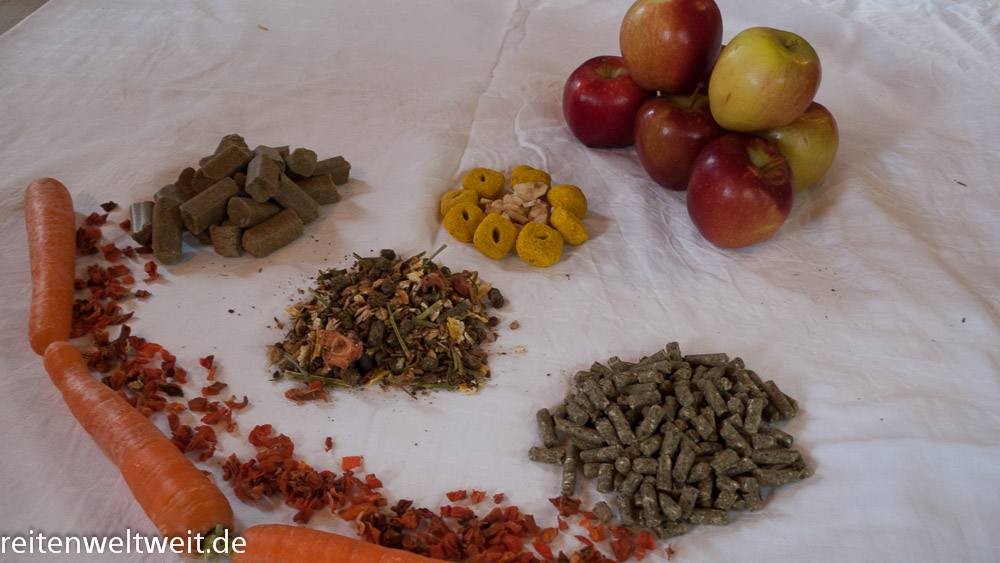Essential vitamins for horses
Vitamins are essential for the health of the horse and support the functionality of the organs.
They stabilize the entire metabolism and together with enzymes and hormones they have the function of a biocatalyst.
The most important vitamins for horses:
Vitamin A
Vitamin A is responsible for the eyesight, the skin and all types of mucous membranes. In general Vitamin A is no component of the normal horse fodder. Instead you need to feed carotenes which are natural components of fresh plants. After the carotenes entered the mucous membrane of the small intestine they get metabolized into Vitamin A.
The organism of the horse always only produces as much of Vitamin A as it actually needs. Therefore an overproduction is impossible. However a horse can suffer from an undersupply if you only feed hay and oats. Then the horse needs an extra portion of carrots and special fodder which is made out of milled grass, clover and lucerne. On some fodder packages you can find information for the daily ration. Mostly this ration is written in I.E. (International Entity/Unit). A horse needs a ration of 500 000 I.E. per day.
Vitamin B
Generally there are different types of Vitamin B. Vitamin B1 is water-soluble and responsible for the decomposition of carbohydrates. Vitamin B2 and Vitamin B12 are important participants of several metabolic processes. In general the normal feeding with hay and oats (good quality) already provides the needed dose of Vitamin B for the horse. A lack of Vitamin B effects a reduction of the decomposition of lactic acid. In this case the acid gets collected in the tissue and this leads to a lack of appetite. If your horse has a high physical activity you should feed additional Vitamin B (brewer´s yeast and wheat germ). An overdose of Vitamin B does not have any negative effects on the health of the horse.
Vitamin C
Vitamin C is responsible for the natural defense of any kind of infectious diseases. It gets produced through the natural metabolic processes of the organism.
Vitamin D
This vitamin is essential for the gastro-intestinal tract and especially responsible for the transportation and elimination (via kidney) of calcium and phosphate. Moreover it supports the strengthening of the skeleton. With the help of UV-rays the organism is able to produce Vitamin D3 on its own. For the production of Vitamin D2 instead the organism needs additional elements of fresh plants. In general a horse that has enough fresh air and gets sun-dried hay is not in danger of any kind of lack or undersupply of Vitamin D. An overdose however can have negative effects on the horse. Therefore horse owners need to be really careful if they feed additional fodder with Vitamin D.
Vitamin E
Vitamin E is absolutely essential for the functionality of the tissue and the musculature. A horse with the weight of 550 kg needs a daily ration of 550 mg of Vitamin E. This daily dose already is provided by 5 kg of sun-dried hay. During the winter period the hay is not fresh anymore and looses parts of its natural Vitamin E. Therefore at this time of the year horse owners need to feed additional fodder which provides this important Vitamin.
Vitamin E is a very helpful medicine if your horse suffers from the muscle disease Tying Up.
Vitamin K
Vitamin K is responsible for the hemostasis. This process stops the bleeding in case on an injury and is therefore essential for survival. The vitamin gets produced by the bacteria of the intestine. Moreover Vitamin K is a component of green leaves and is very UV-sensitive. Until today scientists could not clarify the exact daily dose of Vitamin K for a horse. All we know is that this vitamin really is essential for the organism. A lack of Vitamin K causes diarrhea.
Folic acid
This vitamin guarantees the production of blood cells. The functionality of folic acid is dependent on a sufficient supply of iron. Folic acid is a natural component of any kind of green fodder.
Biotin (also known as Vitamin H, Vitamin B7 or Coenzyme R)
Biotin is a water-soluble Vitamin and its most important task is to guarantee the metabolic processes of the skin. You do not need to feed this Vitamin with additional fodder because it gets produced by the bacteria of the intestine. Especially for the hooves of the horse it has a great importance because it provides strong and robust hooves (important for the fight against Equine Laminitis).
-No responsibility is taken for the correctness of the information provided-
Surf tips:
- Apples, carrots, sugar beets – useful tips for the right feeding
- Did you know that Rose Hips are an ideal vitamin booster for your horse?
- Calcium, Potassium and Co- all information about Electrolytes
- The most important minerals for horses
—All statements without guarantee—



9 Comments
Comments are closed.